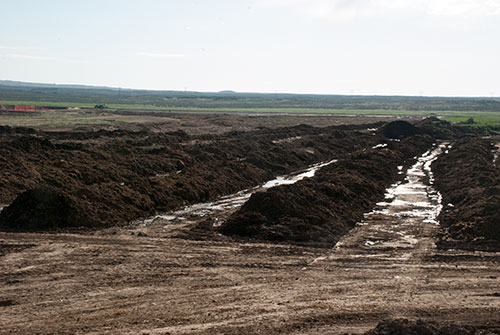
Gypsum, a product recycled from manufacturing and construction waste, has hit the agricultural scene. When added to the soil, gypsum adds sulfur and calcium while reducing phosphorus runoff. In some situations, it can improve water movement and enhance root development.
In many ways, gypsum is also an ideal bedding for dairy cattle, says Mike Hile, with Penn State Cooperative Extension. It has a neutral pH, absorbs moisture well and helps keep bedding bacterial counts low.
Unfortunately, when gypsum ends up in manure storage systems, the anaerobic environment converts the sulfate to hydrogen sulfide gas. Being heavier than air, hydrogen sulfide settles in low areas and is released in bursts that are dangerous to humans and animals during manure movement or agitation.
In his presentation at the North American Manure Expo in Chambersburg, Pa., Hile explained that lower concentrations of hydrogen sulfide (10 to 20 ppm) can be tolerated for extended periods of time, but anything over 100 ppm is dangerous and can be potentially fatal.
Hile and others at Penn State monitored the hydrogen sulfide levels during spring and fall manure agitation on 10 Pennsylvania farms; some were using gypsum, others were not. Measuring devices were placed around the perimeter of the outdoor manure storage to record gas concentration prior to and during agitation.
While almost no hydrogen sulfide was found near the nongypsum dairy manure storages, farms that used gypsum had hydrogen sulfide release during agitation at dangerous levels near the storage. The researchers also found that the highest gas levels occurred the first hour after mixing.
"Any time you work around manure storage, it is dangerous," Hile said, "but gypsum elevates the level of hydrogen sulfide. We want people to be aware of the hazards."
Herein lies the dilemma: does the potential health risk outweigh the benefits of this bedding source? Safety must always be of top concern, but there are ways to use gypsum safely on farms if monitored properly.
Portable instruments using audible, vibration and visual alarms to alert the user of dangerous gas concentrations are available. Such monitors are about the size of a cell phone and cost less than $300. Hile recommended that farms purchase these instruments for people working around any manure storages, especially when gypsum is involved. "Portable monitors are a cheap piece of insurance," he said.








